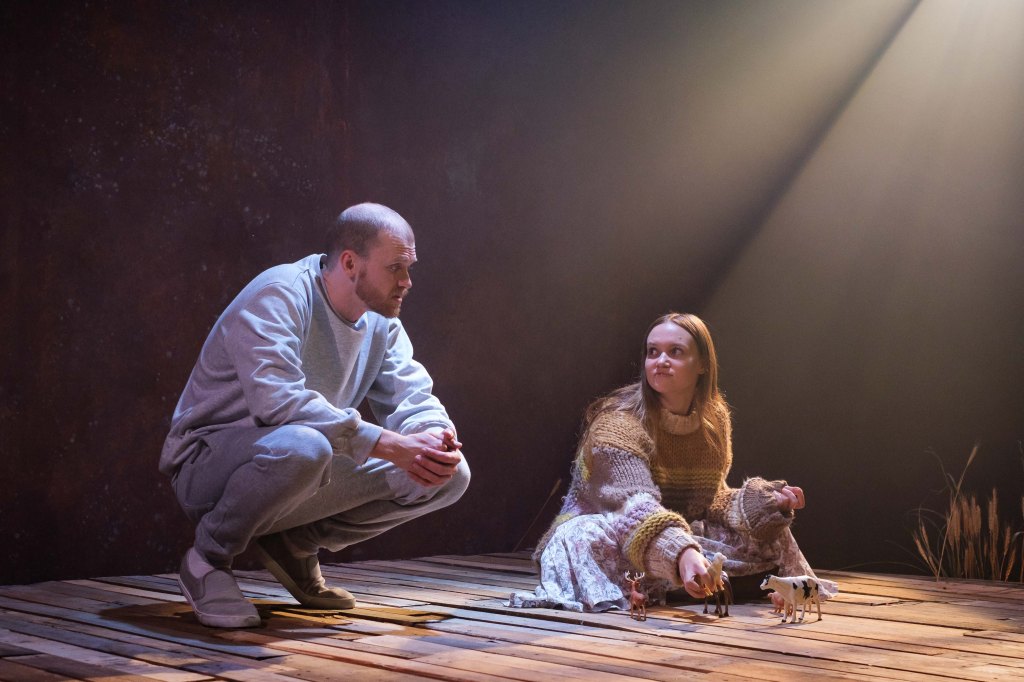
Sacrifice is no longer fashionable. Our post-Christian society rejects it. To us, it has the whiff of exploitation, the distasteful scent of individuality burnt as an offering to duty, a duty perceived as limiting, dehumanising, imposed.
But sacrifice has been valorised by cultures long before the Christian behemoth.
Rob Drummond’s superb play Grain in the Blood explores the concept of sacrifice. Initially, it does this via a modern farming family’s connection with the tradition of the Grain Mother. This ancient pastoral deity requires a sacrifice to ensure the wellbeing of the community. Weave a Grain Dolly, fill its stomach with blood, leave it in the fields. The Mother is appeased …. and so all remains right with the world. (Jam can substitute for blood, if you’re a squeamish modern snowflake.)
The family continues the tradition in the way you might leave out a carrot for Santa’s reindeer; enjoying the ritual, but never believing in it. Or, at least, that’s what they thought they were doing, until one terrible night twelve years ago….
This tight 80 minute play creates suspense by making us wait for answers. What happened on that fateful night? And what exactly is wrong now with twelve year old Autumn? And how is it that her recently returned father has the potential to save her?
This saving has to do with (you guessed it) sacrifice, but not the magical kind exemplified by the Grain Doll ritual. Instead it’s sacrifice as our small, disenchanted world envisions it: a utilitarian* ethic that posits pointy questions, ones like Would you sacrifice one bad man to save one good one? What if it were ten bad men? Would you sacrifice one stranger to save one person you love? These questions are hypothetical, of course. Until they’re not.
Despite its conceit of withholding information, the play is predominantly presented in a naturalistic style. I say despite, because by making us wait for answers, we’re constantly pulled out of the immediacy of the moment, constantly invited to ask things like Why did she say that? What dark event is she referring to? It’s not an uncommon trick in modern theatre, though it’s a difficult one to pull off, and one that puts pressure on the actors to play the moment while trusting the whole.
Drummond’s rich and clever script most definitely pulls it off, and guided by director Victor Kalka, the cast rise to the challenge. Siobhan Lawless powerfully plays the matriarch driven by a steely determination. Ciarán O’Riordan as the returning father offers a poignant portrait of a man buckling under the weight of his past. Genevieve Muratore as Violet delivers a fascinating balance between the warmth of flirtation and the chill of vengeance. Nick Curnow as Bert, an outsider to this clan, an official on business, movingly portrays the dislocation experienced when procedure offers no guide to the wilderness that is reality. And Kim Clifton gives a wonderful performance as twelve year old Autumn, infusing the play’s few moments of theatrical monologue with a marvellous transcendence, only to return to the naturalistic scenes an angry teenager, bewildered by pain and breaking out, because she can, because it’s time to do so, because it can’t matter anymore. Her swearing is hilarious, but in her profanity is also deep pathos.
This brilliant production asks us to think about sacrifice, its nature, its value. And in a most aesthetically provocative manner, it does this through sacrifice – the ancient type. By initially sacrificing full disclosure, by asking us to go without answers, magic happens on stage.
Paul Gilchrist
Grain in the Blood by Rob Drummond
at KXT on Broadway until March 9
Image by Clare Hawley
*I acknowledge that my use of this adjective is not technically correct. I’m simply using it to denote any system that reduces ethics to a tallying of figures.






